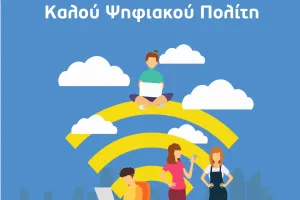The handbook is aimed at middle school educators and focuses on developing students' digital citizenship. Through student-centred activities, it promotes responsible and safe internet use. The main sections of the handbook focus on the following topics:
- Good digital citizenship. Students learn their rights and responsibilities online. They develop resilience against online threats. They practice positive communication behaviours.
- My rights on the internet. Information on data protection and the importance of consent. Introduction to the European strategy for a safer digital environment. Activities to distinguish user rights and responsibilities.
- Communicating with respect online. Understanding how misunderstandings can arise. Teaching strategies to avoid online conflicts and promote positive interactions. Exercises for rephrasing messages in a constructive way.
- You are not alone. Addressing online threats using tools (block/report). Strengthening trust in adults for reporting problems. Practicing safe response strategies in various scenarios. The handbook provides guidance, educational activities, and online tools to support educators in integrating digital citizenship into the classroom.
About this resource
The handbook is aimed at middle school educators and focuses on developing students' digital citizenship. Through student-centred activities, it promotes responsible and safe internet use. The main sections of the handbook focus on the following topics:
- Good digital citizenship. Students learn their rights and responsibilities online. They develop resilience against online threats. They practice positive communication behaviours.
- My rights on the internet. Information on data protection and the importance of consent. Introduction to the European strategy for a safer digital environment. Activities to distinguish user rights and responsibilities.
- Communicating with respect online. Understanding how misunderstandings can arise. Teaching strategies to avoid online conflicts and promote positive interactions. Exercises for rephrasing messages in a constructive way.
- You are not alone. Addressing online threats using tools (block/report). Strengthening trust in adults for reporting problems. Practicing safe response strategies in various scenarios. The handbook provides guidance, educational activities, and online tools to support educators in integrating digital citizenship into the classroom.
About this resource
- digital citizenship digital literacy media education
Related content
- < Previous resource
- Next resource >
- < Previous
- Next >





